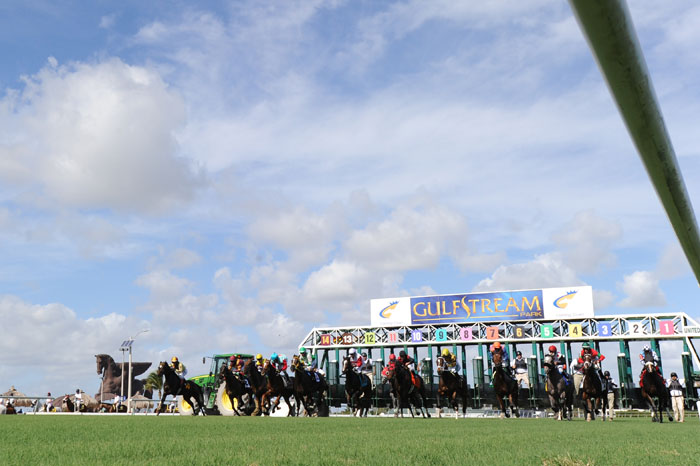By T. D. Thornton
The Florida Senate Regulated Industries Committee on Wednesday took up the issue of a recently negotiated Seminole Gaming Compact that could legislatively lock the state into a 20-year agreement that trades a complex tangle of casino exclusivity rights for a $3-billion revenue-sharing agreement. But racing industry stakeholders concerned about a “decoupling” clause in the plan that would allow pari-mutuel licensees to drop live racing while still remaining open as gaming facilities largely got shut out of the fact-finding discussion, as the topic of potential impacts to the racing industry came up only peripherally in the two-hour hearing.
“We have no opinion on decoupling,” Seminole Gaming chief executive officer James F. Allen testified, tacking on the issue only at the very end of his presentation. “And I know that's obviously a very emotional topic, depending on who is presenting. This does not take into the fact that if decoupling does occur, the value of the real estate, that obviously those individual pari-mutuels would be able to maximize if they were no longer required to offer some type of…racing; the tribe has zero position on this. We recognize 100 percent it is up to the State of Florida.”
Beyond asking a few questions or making points about how the state's existing eight pari-mutuel licensees that operate limited forms of gaming might be affected by the long-term Seminole compact, the legislators and lobbyists who spoke at the hearing were also disinclined to discuss the Thoroughbred, Standardbred or greyhound industries in any depth.
Instead, the hearing followed a trickle-down format, with the largest fiscal and political issues percolating to the top of the discussion. The overall economic impact of the compact, issues with exclusivity and existing lawsuits, how any potential violations of the new compact might affect the flow of Seminole revenue to Florida, and whether certain family-oriented parts of the state (such as Orlando) should be considered off-limits to gambling expansion dominated the talks.
Only in the final moments before adjournment did the committee's chairman, Senator Rob Bradley, emphasize that speakers from other affected industries would be allowed to voice their opinions at a future hearing, which may be scheduled for next week.
“I sympathize with the pari-mutuel industry,” Senator Joseph Abruzzo said near the end of the hearing. “Every year you come up here for these hearings and these bills, and you're back again. We need to one day, and hopefully it is this year, get something done to stop putting your businesses, your employees, and everything through this 'What if?' attitude and making sure they're secure in their jobs.”
The Seminole Gaming Compact currently exists as a negotiated agreement between Florida Governor Rick Scott and the Seminole Tribe. It is intended to replace an expiring 2010 compact, and still must be ratified by the Florida Legislature to take effect. In its simplest format, the compact sets forth an agreement that the Seminoles will not operate their Florida casinos as permitted under the largely restriction-free sovereign-nation law in exchange for the state setting parameters on other casino competitors that operate under Florida law. To sweeten the deal–and to allow the Seminoles to expand their gaming footprint with the addition of certain table games–the Seminoles will make revenue-sharing payments totaling $3 billion to the state over the next eight fiscal years.
The decoupling issue only comes into play as a provision in the compact that the Seminoles will concede to existing licensees. Gulfstream Park, Tampa Bay Downs, Hialeah Park, and the gaming facilities formerly known as Calder Race Course and Pompano Park could, in theory, exercise their options to operate slot machines and card games without horse racing if the proposed decoupling legislation passes. But published reports have indicated that only Calder might attempt a full exit from racing by finding a way to break its lease with Gulfstream, which operates the legislatively required annual race meet on the Calder property.
Jeffrey Woodburn, the policy director for the governor, testified that under the proposed compact, the pari-mutuel licensees authorized to conduct slots play would only be minimally affected by any new nuances in the agreement.
“The only exception would be that there would be a cap of 2,000 slot machines that doesn't exist in the current one, and that's based on what current state law is,” Woodburn said. “[And] those eight pari-mutuels would not be able to relocate, which is consistent with the current compact as well.”
But Senator Jack Latvala pressed Woodburn on a separate plank of the compact that would allow for an additional pari-mutuel licensee to be granted slots privileges in the Miami area. If decoupling were to be written into the law, Latvala wondered if the potential new “Miami super permit” slots facility had to be a racetrack.
“Is there anything in the compact that requires that permit, if the Legislature does it, to support live racing of any kind?” Latvala asked. “I mean, is there any requirement that it has to be greyhound, horse, harness, or jai-alai?”
“No sir,” Woodburn answered.
“So that new permit, even though it's called a 'pari-mutuel permit,' could just be a casino?” Latvala asked.
Woodburn's answer was inaudible on the video simulcast. But Latvala appeared satisfied that it was an affirmation to his question before the hearing moved on to another, non-racing-related, topic.
Not a subscriber? Click here to sign up for the daily PDF or alerts.






